

The Economics of the 1%: Neoliberal Lies About Government (1/3) John Weeks deconstructs a central tenet of neoliberal ideology: vilification of the government's role in the economy - Bio John Weeks is Professor Emeritus of the University of London and author of the forthcoming book, The Economics of the 1%: How mainstream economics serves the rich, obscures reality and distorts policy.
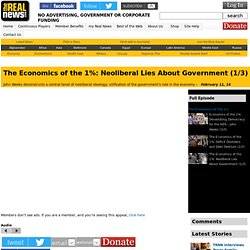
His recent policy work includes an supplemental unemployment program for the European Union and advising the central banks of Argentina and Zambia. A nice, concise history of climate science. A nice, concise history of climate science Dan Crawford | November 20, 2013 10:42 pm Hot Topics Skeptical Science offers a nice, concise history of climate science:
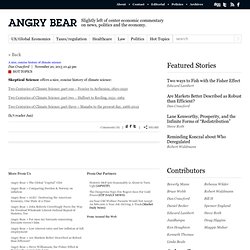
Wall Street isn't worth it: John Quiggin on cutting finance down to size. Photo by Alex Wong/Getty Images John Quiggin has an engaging piece in Jacobin arguing that "Wall Street Isn't Worth It" and the growth of the financial services sector has come at the expense of the rest of society.
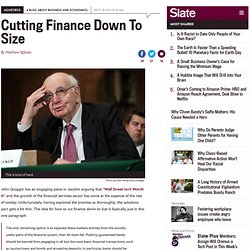
Unfortunately, having explored the premise so thoroughly, the solutions part gets a bit thin. The idea for how to cut finance down to size is basically just in this one paragraph: The only remaining option is to separate these markets entirely from the socially useful parts of the financial system, then let them fail. Publicly guaranteed banks should be banned from engaging in all but the most basic financial transactions, such as issuing loans and bonds and accepting deposits. The Brain Drain From Finance - Points and Figures. At Startup Management, they posted an article showing stats on where top business school graduates are going to work post graduation.
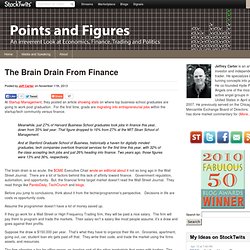
For the first time, grads are migrating into entrepreneurial jobs within the startup/tech community versus finance. Meanwhile, just 27% of Harvard Business School graduates took jobs in finance this year, down from 35% last year. Actually, Economists Can Predict Financial Crises. Economists have long argued that they shouldn’t be expected to predict crises, such as the one that almost sank the global economy five years ago.
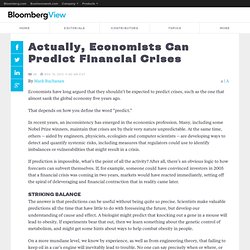
That depends on how you define the word “predict.” In recent years, an inconsistency has emerged in the economics profession. Many, including some Nobel Prize winners, maintain that crises are by their very nature unpredictable. At the same time, others -- aided by engineers, physicists, ecologists and computer scientists -- are developing ways to detect and quantify systemic risks, including measures that regulators could use to identify imbalances or vulnerabilities that might result in a crisis. Actually, Economists Can Predict Financial Crises. Listen Keynesians, It’s the System! Response to Palley. John Bellamy Foster (jfoster [at] monthlyreview.org) is editor of Monthly Review, professor of sociology at the University of Oregon, and author (with Fred Magdoff) of The Great Financial Crisis (Monthly Review Press, 2009).
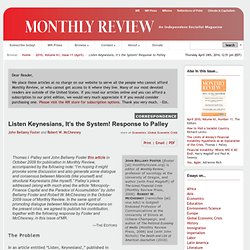
Robert W. McChesney (rwmcches [at] uiuc.edu) is Gutgsell Endowed Professor of Communications at the University of Illinois at Urbana-Champaign, and author of The Political Economy of Media (Monthly Review Press, 2008) and (with John Nichols) The Death and Life of American Journalism (2010). Thomas I. Palley sent John Bellamy Foster this article in October 2009 for publication in Monthly Review, accompanied by the following note: “I’m hoping it might provoke some discussion and also generate some dialogue and consensus between Marxists (like yourself) and structural Keynesians (like myself).” Chart of the Day: No Inflation in the Developed World Despite QE. By Marc Chandler, Global Head of Currency Strategy, Brown Brothers Harriman After several years of asset purchases by central banks, and in other ways, extremely easy monetary policy, general price levels have not shown the kind of inflation that many observers have feared.
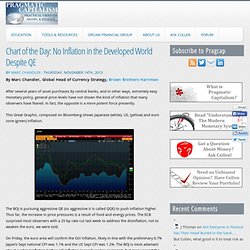
In fact, the opposite is a more potent force presently. This Great Graphic, composed on Bloomberg shows Japanese (white), US, (yellow) and euro zone (green) inflation. The BOJ is pursuing aggressive QE (so aggressive it is called QQE) to push inflation higher. Thus far, the increase in price pressures is a result of food and energy prices. Inbox (86) - rbutler - San Diego State University Mail. Low Wage Workers Weren’t Always Left Behind - Real Time Economics. Report: An Unfinished Mission: Making Wall Street Work for Us. A Report by Americans for Financial Reform and the Roosevelt Institute Edited by Mike Konczal and Marcus Stanley Published November 12, 2013.
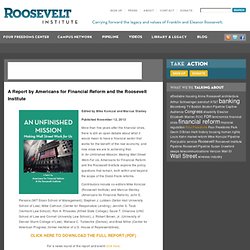
View: Opinions & Blogs on Finance, Politics and Economy. Ripping Off College Students Economic Future. Food Stamp Cuts Add to Walmart’s Troubles. Big Pharma’s focus on blockbuster cancer drugs squeezes out cheaper treatments.

The result, one researcher says: ‘If we’re winning the war on cancer, we’re not winning that fast.’ Michael Retsky awoke from surgery to bad news. Ripping Off College Students Economic Future. Heading toward a Cliff. Heading toward a Cliff By Andy Xie 11.05.2013 The global economy is likely experiencing a bigger bubble than the one that unleashed the 2008 crisis, and should it burst the ensuing recession would be mammoth The U.S.
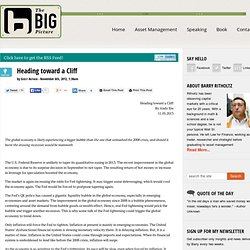
Federal Reserve is unlikely to taper its quantitative easing in 2013. The recent improvement in the global economy is due to its surprise decision in September to not taper. The US Government is not “$16 trillion in the hole” Total – Treasury-Owned Gold 261,498,926.247 $11,041,059,958.16 Department of the Treasury Financial Management Service STATUS REPORT OF U.S. TREASURY-OWNED GOLD September 30, 2013. A study in the dynamics of international flows… #2. In part #1 of this series on international flows, Norway’s trade deficit of the 1960′s was associated with foreign investment coming into their country. So the net trade deficit of the Current Account was matched by the net foreign investment surplus of the Capital and Financial Account. There is a principle in international income accounting… A country’s Current Account balance is matched by Net Foreign Investment.
A study in the dynamics of international flows… #3. Mr. A study in the dynamics of international flows… #4. Part 1, Part 2, Part3 Yesterday I criticized Mr. Krugman for saying that savings were in excess. I said that personal savings is down, and domestic savings are not enough to cover investment such that the US has to borrow from abroad. This post will explore the relationship between domestic savings, domestic demand and the Current Account balance. I start with a story yesterday from Spiegel Online International that pointed to Germany’s very large trade surplus, which is higher than China’s. “The Treasury’s semiannual currency report criticized Germany’s over-reliance on exports, a high current-account surplus and weak domestic demand. Why is Germany’s high Current Account surplus a problem?
Richard Thaler on Behavioral Economics. Deficit Disorder Symptoms–via Naked Capitalism/New Economic Perspectives. By Linda Beale. Strange logic to expectations. Stiglitz: Why Economics Matters. Stiglitz: Why Economics Matters. The Big Picture. Nobody Should Shed a Tear for JP Morgan Chase. Taibbi writes: "So again, $13 billion sounds like a lot of money. But Bernie Madoff is doing 150 years, and nobody in this cast of characters will personally pay a dollar in fines. 10 Weird Ways Your Brain Is Tricking You. Health. 18 Signs Economists Haven’t the Foggiest. 18 Signs Economists Haven’t the Foggiest. What Happened to the Part-Time Employment Story? What Happened to the Part-Time Employment Story?